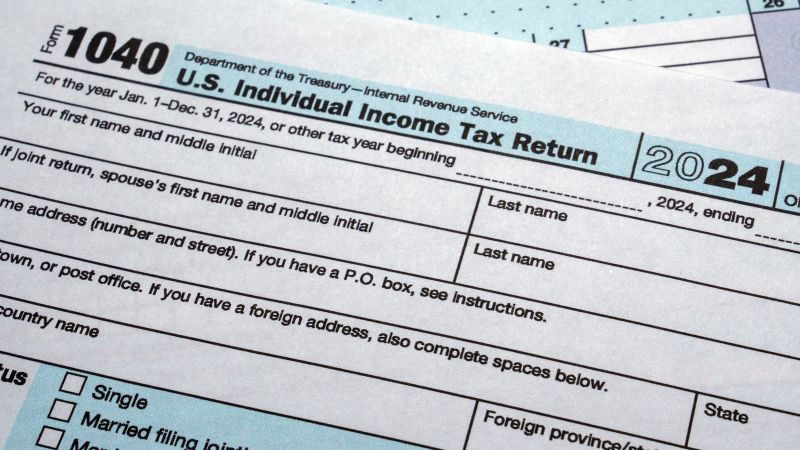CNN
—
As the April 15 tax filing deadline fast approaches, fewer Americans have filed their federal taxes, and more have requested extensions, at this point in the filing season compared to last year, according to the latest public data and private Internal Revenue Service numbers obtained by CNN.
The IRS had received nearly 1 million fewer tax returns, or 1.1% less, than the agency had received in the same period last year, as of March 21. The drop by itself isn’t necessarily a concern, nor is it unusual, according to experts who spoke to CNN.
There have been declines in recent years for this time period. But this year’s drop comes amid concerns about possible declines in revenue collection, and as the IRS faces massive staffing cuts, disruptive leadership changes, a battle over whether to cooperate with immigration authorities, and internal conflicts with Elon Musk’s Department of Government Efficiency.
The cause of this year’s drop isn’t clear, but former IRS officials and tax experts say it could be due to a combination of reasons. Among them:
Taking advantage of the chaos: Some people may be hearing about tumult inside the IRS and believe they can get away without filing their taxes this year.
“There’s a working theory that some people might be rolling the dice and taking their chances,” said a source familiar with discussions among IRS officials about the drop in filings.
A Treasury Department spokesman didn’t respond to CNN’s request for comment about a recent Washington Post report that the IRS has noticed an uptick in online chatter about people skipping their taxes this year.
Fear of deportation: Undocumented immigrants register with the IRS and pay billions of dollars in taxes every year. Multiple sources said members of this community might be holding back during this tax season, as the Trump administration tries to use IRS data to facilitate deportations.
Nina Olson, who served from 2001 to 2019 as the National Taxpayer Advocate within the IRS and now runs the nonpartisan Center for Taxpayer Rights, said her group has been in touch with undocumented immigrants who are taking a “wait-and-see” approach this tax year.
Some are requesting extensions, Olson said, and therefore won’t need to file tax returns until October. Internal IRS data obtained by CNN indicates that about 200,000 more taxpayers have asked for extensions this year, compared to the same time last year.
Weather events: Natural disasters, such as the Los Angeles wildfires in January, could also account for some of the mid-season filing decline.
When people are displaced, it’s harder for them to access the financial records they need to file their taxes. The IRS typically grants filing extensions en masse to individuals and businesses in federally declared disaster areas, like people affected by Hurricane Helene last year.

Confidence in the process: Improvements to the IRS’ consumer-end experience might make some taxpayers feel like they can wait until the last minute and still get their refunds without issue.
Despite the IRS chaos and cuts, internal data obtained by CNN shows that wait times on customer service phone lines have held steady at three minutes for individual taxpayers, compared to last year. CNN reported last month that tax season has been going relatively smoothly, with few glitches, and tax professionals largely experiencing business as usual.
About 9.7 million taxpayers have called the IRS this year for help, according to the data. The three-minute wait time is a major improvement from the 28-minute wait times a few years ago – before the IRS got an $80 billion infusion from former President Joe Biden’s signature Inflation Reduction Act, which congressional Republicans have since partially clawed back.
“When it took forever to reach the IRS, people started their tax returns early, in order to get things done,” said R. William Snyder, an accounting professor at George Mason University. “But lately, in the past two or three years, things have been getting better. People feel like they can wait until the last minute. The IRS got better, so people got more complacent.”
Waiting to pay: The 1.1% drop in returns so far may be tied to the fact that the number of returns with balances due – as opposed to a refund paid out – has been going up in recent years, said North Carolina-based CPA Jim Buttonow, who worked at the IRS for nearly two decades before going into the private sector.
“That’s the only big delta I see,” Buttonow said.
Traditionally, taxpayers who expect big refunds tend to file early in the season, and people who still owe money to the IRS file closer to the April 15 deadline. But, Buttonow said, in recent years, the intake of returns has become more spread out across the filing season.
The IRS has paid out about $179.5 billion in refunds so far this cycle – that’s about $10 billion more than at this point last year, according to publicly available statistics. The average refund paid was $3,221.
Refusing to file in protest: Every year, a small number of filers politically object to filing and paying taxes for different reasons. This year is no different.
Olson said someone recently sent her a letter in the mail containing a copy of an angry letter they had sent to Treasury Secretary Scott Bessent.
“It said they didn’t want to file their tax return and pay taxes because they were upset that the Trump administration was trying to breach taxpayer confidentiality,” Olson said.
Putting things off: “It may be people are procrastinating a little longer,” said Mark Mazur, a former director at the IRS Office of Research, Analysis and Statistics and a former assistant secretary for tax policy at the Treasury.
The Washington Post reported last month that some senior Treasury Department and IRS officials are bracing for a potential 10% drop in tax collected by April 15 relative to last year. Such a drop could total more than $500 billion in lost revenue for the federal government, the paper noted.
So far, however, the latest data suggest revenue is currently pacing ahead of where it was last year.
For the week ending March 21, the Treasury reported a 4.5% increase in the total dollars collected. And a Treasury spokesperson dismissed as “baseless” any claims suggesting there may be a revenue decline for the season.
“There is no indication a $500 billion tax revenue drop is plausible,” the spokesperson said.
In either case, when it comes to assessing revenue intake for the whole season, “it’s too soon to tell,” said Janet Holtzblatt, a senior fellow at the Urban-Brookings Tax Policy Center who spent much of her career working in the tax analysis division at both Treasury and the Congressional Budget Office.
A lot of factors will determine how the IRS’ revenue haul this year will compare to last year. On the one hand, thanks to big stock gains and a good jobs market in 2024, taxable investment income and earnings may come in strong, Mazur said.
On the other, Holtzblatt said, it’s hard to say how President Donald Trump’s tariffs and other economic policies may affect the first-quarter 2025 estimated taxes that businesses, partnerships and sole proprietors must file by April 15.
The opportunity to use the new IRS Direct File program, which lets eligible taxpayers file their taxes directly with the IRS for free, was expanded to residents of 25 states this year, up from 12 last year when the agency piloted the program.
Internal IRS data obtained by CNN show that 135,000 people had chosen to use Direct File through March 21.
There are no directly comparable statistics for the same period last year, because the pilot was rolled out in stages and far fewer people were eligible to use it.

But a recent analysis by the Treasury Inspector General reported that during the pilot – which ran last year from February 1 to April 20 in just 12 states – 140,803 people submitted tax returns that were accepted by Direct File. (More than 35,000 were rejected because of various issues.)
Given that people typically are slow to adopt new programs when it comes to doing their taxes, Mazur said, the 135,000 users so far “seems like it’s on the right trajectory for a new product.”
The IRS had been planning to make Direct File a permanent option for tax filers, but its future is not at all clear.
In his confirmation hearing, Bessent would only commit, when asked, to the program remaining operative this year. The tax lobby as well as some Republicans have been pushing to abolish the program. And some actions this year by Musk and his DOGE staffers created confusion about whether the program will survive.
“No one’s expecting a lot from Direct File,” said Olson, the former IRS taxpayer advocate, who supports the program. “It’s still a new product, and it’s still limited in terms of who can use it. It’s purposely being rolled out in a modest fashion … But this may never get out of the pilot stage.”

